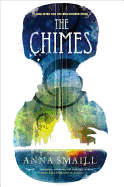
Longlisted for the Man Booker Prize, Anna Smaill's first novel, The Chimes, infuses the well-used dystopian trope with a twist: the ruling class delivers oppression through music.
In a London torn apart by civil war, a monastic society called the Order lives in seclusion, writing music to be played on the Carillon, a giant organ crafted from pure palladium. The population outside the Order's walls hears two melodies: Onestory, in the morning, which tells of the war, and Chimes, in the evening, which erases all memories of the day. Citizens are left with only "bodymemory," the muscle memory and second-nature actions required to fulfill their occupations, and "objectmemories," possessions connected with important experiences now forgotten that inspire traces of emotion. Attempts to recover the past are considered crimes of "blasphony"; the Order claims that its status quo prevents another war.
Before she dies of "chimesickness," a condition the Order says is an urban legend, Simon's mother urges him to go to London. Once there, he takes up with a band of youths who aim to collect bits of the legendary palladium weapon to sell. Lucien, their golden-haired, blind leader, thinks Simon may hold the key to stopping the Carillon forever, but the Order threatens both their mission and their budding romance.
Smaill's clever use of musical terms in her characters' speech adds to the immersive quality of the work, and her melodious prose lures the reader like a pied piper. With literary trappings but a solidly speculative heart, The Chimes is a cantata of pure delight. --Jaclyn Fulwood, blogger at Infinite Reads

